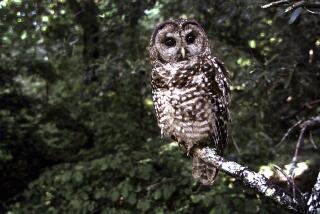A plea to hunter Corey Knowlton: Don’t shoot endangered black rhino
There are so many things wrong about the Dallas Safari Club’s ludicrous auction of a permit to hunt a black rhino in order to raise money for conservation of black rhinos. Let’s just start with the idea that the club has the temerity to call this effort a “fundraiser,” implying some charitable goal -- when the real goal is to offer a clever way to persuade the Namibians to grant a permit outside their country (which they usually don’t do) and get some public relations cover for the safari club. (That has backfired.)
Now, let’s move on to the logic behind buying a permit to kill a member of an endangered species -- by showering money on efforts to conserve that species. It’s like some human sacrifice to mollify the gods and ensure the survival of all the other humans. A quick look at the numbers: Early 20th century European hunters essentially slaughtered these majestic beasts, one of the world’s oldest living mammals -- what the international animal protection group World Wildlife Fund calls “a living fossil.” By the end of the 1960s, there were 70,000 of them on the African continent. Poaching (each animal has two and sometimes three ivory tusks) and habitat loss has whittled their population, today, down to about 4,800 across their entire African range. Almost 2,000 of them are in Namibia.
Even though these animals are protected under a number of international treaties, very limited hunting of them is allowed by law. The Convention on International Trade in Endangered Species of Wild Fauna and Flora grants Namibia an annual export quota of five hunted black rhinos.
I’m not particularly happy with the fact that any hunting is allowed in that country. But even if it is, I do not believe the Dallas Safari Club should be selling a permit to hunt, even in the name of conservation. It sends the message that trophy hunting -- and that’s what this is -- is humane and justifiable if it’s offset by some charitable act. The club has said the winning hunter will only be allowed to target troublesome, aggressive older males terrorizing other animals. If there are rhinos that are dangerous to the rest of the population, then killing it is an acceptable act of management. And it should be done by wardens in Namibia, not trophy-seeking recreational hunters.
Just as troubling in all this is that the U.S. Fish and Wildlife Service, which generally does not allow the import of endangered animals from outside the country, could grant an exception for this hunter. It should not. Denying an import permit would stop this. Hunters want to bring their kill back with them as trophies.
The winner of the auction, which took place about a week ago, is Corey Knowlton, who paid $350,000 for the right to hunt. Knowlton, an experienced hunter who leads hunting expeditions, lives in North Texas. The publicity generated by the auction has focused a harsh light on him. Knowlton has told media outlets that he has had death threats directed at him and his family. That’s horrible. The issue here is about halting killing, not redirecting it.
Knowlton recently told a media outlet that he simply wanted to experience a black rhino. “If I go over there and shoot it or not shoot it, it’s beyond the point.”
So I’d like to issue this plea to Knowlton: Don’t shoot it. You’ve made the donation to a good cause. Now, follow through with your own personal conservation effort and save one endangered rhino from being your trophy.
For Knowlton and for all of us, experiencing a black rhino should be about glimpsing it in the wild or at a zoo. The only thing we should be using to shoot it is a really good camera.
ALSO:
Don’t just legalize marijuana, free prior offenders
Pregnant and dead in Texas: a bad law, badly interpreted
It took longer for Ohio inmate to die than it takes to read this post
More to Read
A cure for the common opinion
Get thought-provoking perspectives with our weekly newsletter.
You may occasionally receive promotional content from the Los Angeles Times.







